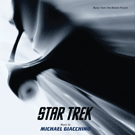'Star Trek' Soundtrack Review
 STAR TREK Music by Michael Giacchino
STAR TREK Music by Michael Giacchino
Review by Adam Cohen
From the opening of Michael Giacchino's score, "Star Trek" reveals itself to be a bombastic musical journey.
As many of you already know "Star Trek" tells the story of the original crew's beginnings, depicting the coming together of James Kirk, Mr. Spock, Dr. McCoy and the other classic heroes of the Starship Enterprise. And with a 43-year history, "Star Trek" has a lot of reference material- including its music.
However, contemporary innovation is the mantra of this production. So, if you are expecting a scaled-up version of the classic series' music, you're going to have to wait until the very end to get your Alexander Courage dosage. But more on that later.
"Star Trek" is dominated by a heroic leitmotif, an arrangement which serves as young Jim Kirk's theme. On first listen, the theme stands out as being absolutely ubiquitous- almost to a fault. Is it a catchy hook or a musical crutch for Giacchino? Or is it both? That depends on your musical taste- but it is the overriding identity of the score. Your love or dislike of this theme will probably determine your overall opinion of the film's music.

The most pleasing version of this theme is the track titled "Labor of Love." Without having seen the film, there's no context for its use as of yet- but one can imagine the Starship Enterprise being pieced together with a teenage Jim Kirk looking on. It's not nearly as soaring as Jerry Goldsmith's legendary "The Enterprise" track from "Star Trek: The Motion Picture," but comparing anything to that composition may be unfair.
"Enterprising Young Men" is another standout piece- this likely playing around the time Kirk and McCoy make their way into outer space, approaching their eventual home for presumably the next several years. This track shares an emotional identity with former-Trek composer James Horner's "Apollo 13" score. It's all about adventure!
How's the action music? Very good. There are trace elements of Alexander Courage and Frank Steiner's original series-style in this new composition. While we (unfortunately) don't get a straight riff on the "Amok Time" fight music, the use of percussion and horns are stylistically in the same vein. The villain theme is reminiscent of John Williams' "Death Star" theme from the original "Star Wars"-- simple and old-Hollywood in style. And Giacchino adds what has become a common choice among composers of late- the "Apocalyptic Chorus." You know the kind of music- it's used in every single action movie trailer (close your eyes and you can see things exploding when you listen to it). You also get some quasi-Middle Eastern wailing found in 90% of Ridley Scott movies since "Gladiator." For "Star Trek" this isn't a bad choice, remember that the original theme song consists of some opera lady singing. But from a critical view, this use of a chorus is a tad trite. By the score's end we arrive at a musical high-point. "That New Car Smell" is a somber yet noble piece. It is quite emotional, progressing towards a rousing finish.

And that leads us to the wrap-up "To Boldly Go" and "End Credits" which finally delve into Alexander Courage's original theme with full force. What may be an unfortunate consequence of Giacchino saving the original theme to the very end is that it feels incongruous with the rest of the score. Sure, there are those elements mentioned above in the action music, but they are subtle and not used frequently. It feels as if there are two identities occupying the same space in this score- and they don't mesh well. Had Giacchino managed to stylize the new music to consistently match the original theme throughout, then this issue might have been avoided. Alternatively, if he had rearranged Courage's music to align with his own composition, the end product would have been more successful.
My expectations for this score were actually very high, which probably colors this review. Giacchino is a superb talent- his work on "The Incredibles," "Mission: Impossible III" and "Ratatouille" are among the best film scores of the last several years. He has imbued his orchestral work with jazz elements in the past, similar to Courage and Steiner from the original series. Giacchino's track record suggested a perfect fit for "Star Trek." While he fails to bridge the movie to the original series in a satisfying way, he has delivered a solid score. I look forward to his work on the inevitable sequel- where I think he will develop his "Trek" identity further. There is a good foundation here, but similar to Hans Zimmer and James Newton Howard's work on the Christopher Nolan "Batman" series, sometimes it takes two shots to make a real breakthrough on a property.
Score: 7/10.
Adam Cohen is the editor of "The Jack Sack," a "24" blog.

